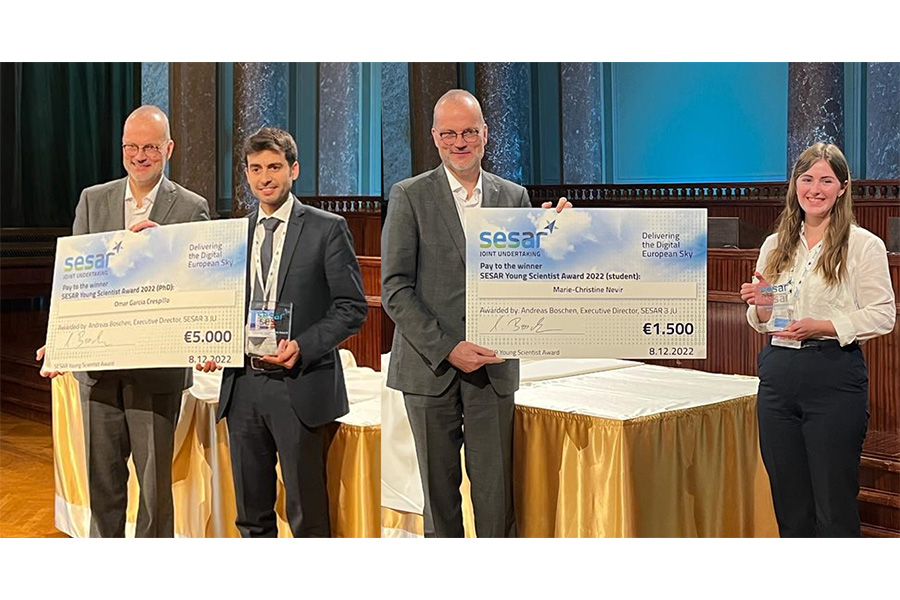Europe’s most promising young minds in air traffic management (ATM) research were celebrated at the SESAR Young Scientist Award ceremony, which took place during the closing plenary of the SESAR Innovation Days conference on 8 December in Budapest.
Awarded annually, the prize aims to distinguish young scientists, who have demonstrated excellence in ATM and aviation-related research fields. The award also provides researchers starting out in their career with an opportunity for further professional development. A further objective of the award is to showcase the potential of young talent to formulate fresh ideas and solutions to the challenges facing ATM and aviation.
The 2022 edition recognised scientific excellence in two categories; PhD and students (undergraduate/master). The awards were presented during a ceremony, presided over by Andreas Boschen, Executive Director, and Peter Hotham, Deputy Executive Director, SESAR 3 Joint Undertaking, and featured presentations from all short-listed scientists from both categories.
Taking third place in the PhD category was Raul Saez Garcia, Technical University of Catalonia, for his work on traffic synchronisation with controlled time of arrival for cost-efficient trajectories in high-density terminal airspace. The jury commented positively on the originality of the work, which focused on energy-neutrality of these trajectories.
Jan Evler, Institute of Logistics and Aviation Technische Universität Dresden, was awarded second place for his thesis on an integrated schedule recovery model that enables airlines to define their optimal flight priorities for schedule disturbances arising from air traffic flow management (ATFM) capacity constraints. In their evaluation, the jury said that the identified approach is sound and is presented convincingly, and the work was helping to fill a gap in ATFM slot regulations during capacity constraint and was therefore very relevant to ATM and aviation.
The top award in the PhD category went to Omar Garcia Crespillo, German Aerospace Center (DLR) & Swiss Federal Institute of Technology Lausanne (EPFL), for his work on Global Navigation Satellite System (GNSS)/Inertial Navigation System (INS) Kalman filter integrity monitoring with uncertain time-correlated error processes. The jury praised him for a very well structured and written thesis, which demonstrated excellent scientific rigour and innovation in terms of the simulation approaches used to validate and assess the availability and continuity of GNSS/INS systems, taking into account airport locations and aircraft trajectories.
In the students’ category, the third prize went to Georgios Papadopoulos, University of Piraeus, for his application of deep reinforcement learning for conflict detection and resolution. The jury found the thesis to be innovative in terms of the solution proposed.
Taking second prize in the category was Maximilian Simonetti, Technical University Munich (TUM), who modelled of barometric altimeter measurements to support geodetic altitude navigation, an enabler for urban air mobility. The jury commended the very thorough theoretical and experimental analysis, and the scientific excellence that Simonetti demonstrated in his work.
The top prize among the students went to Marie-Christine Nevir, Technische Universität Dresden, who developed and initially validated a new workload model for sector-less airspace (i.e. flight centric air traffic control). The jury praised Nevir for the very high level of innovation demonstrated in her work for tackling controller organisation in light of this this relatively new operational concept. Also, the approach used was considered outstanding, as it includes model calibration and validation, and inclusion of basic physiological measurements.
“I want to congratulate all the applicants, short-listed candidates, and our overall winners, Omar Garcia Crespillo and Marie-Christine Nevir. Innovation requires talent like these young scientists; we count on their skills and fresh thinking to help us deliver on our promise of a Digital European Sky!” said Andreas Boschen, Executive Director of the SESAR Joint Undertaking.

